Clannishness – The Series: Zigzag Lightning in the Brain
(This is also published at the Unz Review.)
This will be the first column in a series on the broad human behavioral dimension dubbed “clannishness” by HBD Chick. I’ve talked quite about clannishness here, and of course it is the main theme of HBD Chick’s blog.
For background, see:
start here | hbd chick
clannishness defined | hbd chick
big summary post on the hajnal line | hbd chick
Those Who Can See: Why Re-Colonization? Commonweal Orientation
200 Blog Posts – Everything You Need to Know (To Start): Intraracial group variation and HBD Chick’s theory
The Rise of Universalism
National Prosperity
(Note: the above links are here for a reason. Before commenting about confusion about something I talk about here, try checking to see if it was discussed in the above.)
Yes, clannishness is a real human quality (as the above make abundantly clear). It is a distinct cluster of behavioral traits and attitudes (see Predictions on the Worldwide Distribution of Personality) that correlate with each other globally (and to an extent on an individual level). All human groups (particularly post agricultural/horticultural ones) fall somewhere on this dimension:

In this series, I will explore different facets of this clannishness dimension. (Each entry in this series probably won’t be sequential, but they will come.) In this entry, I’ll look at one particular aspect of this divide: the “curious” phenomenon of Western inventiveness.
There is little question that Northwestern Europeans have excelled in arena of discovery and science. Indeed, it was Northwestern Europeans that gave us science as we know it. Northwestern Europeans brought about the Scientific and Industrial Revolutions and continue to be at the forefront of discovery today. The modern world as we know it would not exist without Northwestern European contributions.
Why is this case? Why has one corner of the world contributed so much? Various (mostly stupid) ideas have been put forward to explain this. Most discount the role of biology in leading to these outcomes. As we’ve seen previously (e.g., Demography is Destiny, American Nations Edition), societal differences are driven by biological differences between people. In short, the people make the society. Northwestern European inventiveness is no exception.
Many of those who are biologically aware credit average IQ as having a role, and indeed it does. There won’t be much progress or discovery without raw brain power. Let’s look at the average IQ across the world:

And taking to account the European diaspora:

We see that IQ is indeed important. However, as the following maps will show, IQ is clearly not the only factor operating here:

An edit of a map found here.

Data from here.

Data from here.

(Source)
As we can see, average IQ is part of the story, but far from all of it. Particularly, despite having roughly the same average IQ, Eastern Europeans and East Asians underperform relative to Northwestern Europeans (and their offshoots). This isn’t even entirely of matter of lack of “manpower”, as this map of the number of researchers per million shows (from here):
Russia and Eastern Europe, for example, lag noticeably behind the Northwest. Japan and South Korea underperform both in total output (somewhat) as well as in the top prizes (they do perform much better in patents per capita, however). The latter two countries indicate that it’s not just a matter of national wealth or funding that drives these patterns.
A recent paper (discussed by James Thompson – Psychological comments: Asians: bright, but not curious? ) looked specifically at the East Asian-European gap in top prizes. But as we see, there is a noticeable gap within Europe. Particularly, the Northwestern countries are quite a bit ahead both the Southern and Eastern countries (as is the case with so many other things). The north-south disparity is to be expected due to the IQ cline:
But what about the east-west disparity? That’s harder to explain solely with IQ.
Even among the Northwestern countries, the more Germanic countries stand ahead of the rest.
Northwestern Europe, particularly the Germanic countries, have long been centers of development and progress. Indeed, Charles Murray wrote a whole book on that. In Human Accomplishment: The Pursuit of Excellence in the Arts and Sciences, 800 B.C. to 1950, Murray noted where the great scientists, mathematicians, and artists tended to originate. Overall, the pattern looks like this (as cited by HBD Chick – “core europe” and human accomplish-ment | hbd chick):
This pattern of innovation stemming from “core” Europe persists to the present day, as seen by patent applications per capita there (from here):
Indeed, a project tracing the place of birth and place of death of historically notable people across the world (and particularly Europe and North America) reproduces this pattern. See The History Of Cultural Migration, Mapped. Indeed, the animated visualization of this process over the last 2,000 years is mesmerizing to watch. You can actually watch civilization appear before your very eyes:
This video explains more of the process:
Interestingly, the latter video shows the rise of modern Europe and its siring of the American Nations. In essence, it is a visualization of much of what HBD Chick and I have discussed in our writing.
What is responsible for this pattern? Kura, te Nijenhuis, and Dutton blame the difference on a composite of novelty-seeking, social anxiety, fear of exclusion, and individualism. In their paper, they claimed that “Europeans” (all Northwestern Europeans) were less socially anxious, less fearful of exclusion, more novelty-seeking, and more individualistic than East Asians. Readers here will be familiar with this pattern: these are elements of personality differences as described previously in Predictions on the Worldwide Distribution of Personality, where I discuss variation in global personality in the HEXACO system. Particularly, more individualistic and more novelty seeking are facets of high Openness to experience. Fear of exclusion is an aspect of high Emotionality (and possibly high Agreeableness). And social anxiety is a facet of low eXtraversion. See also Staffan’s post on the Northeast Asian variant of the shame culture, the face culture: Honor, Dignity, and Face: Culture as Personality Writ Large | Staffan’s Personality Blog
The HEXACO captures variation in clannishness across the world. However, I wouldn’t want to reduce the difference to variation in personality dimensions, because ultimately the HEXACO is a theoretical construct (and an incomplete one) which partially captures the underlying variation. The variation is real; the system of personality traits and our various other measures merely approximate it. In any case, I think something deeper and more fundamental is going on here than just personality.
Others have suggested that the difference is creativity; East Asians are simply less creative than Westerners, so the story goes. The title of this entry is a reference to a quote “Genius is a zigzag lightning in the brain which other men have not,” which itself was quoted by Steve Sailer in an old VDare article discussing Gregory Clark’s A Farewell to Alms. Sailer noted that Clarkian selection produced intelligence in both Northern Europe and East Asia, but it could not have been responsible for the apparent creative ability of some of the former. I suspect that raw creative ability is involved, but I think that’s hardly the whole story.
For one, I’m not sure we can say Northwestern Europeans are the most creative people in the world. Blacks have demonstrated substantial creativity, particularly in music and entertainment. But likely this doesn’t translate into scientific ability in good part because of Blacks’ lower average IQ. But nonetheless, I think here’s something more fundamental going on here:

To which group does the flower on the bottom belong? This was the subject of a few of HBD Chick’s posts (do you think like a westerner? ; do you think like a westerner? (repeat); and east vs. west?). Essentially, research pioneered by Richard Nisbett found that “Westerners” (all Northwestern European in descent) tend to group the flower with group B, while “Easterners” (East Asians) group the flower with group A. Essentially, this is a test of abstract vs. holistic thinking between each group. This videos discuss it in further detail:
In the flower example, NW Europeans will group the flower with group B, because they all share the same stem. It’s a crisp rule that sharply delineates one from type of flower from the other. East Asians, on the other hand, will group the flower with group A, because they share “superficial” characteristics. The first video gives another example at time point 36:57. A set of three objects, a giant panda, a monkey, and a banana, were presented to Whites and to East Asians. Participants were asked to group two of the objects together. Westerners grouped the panda and the monkey (since they’re both animals). Easterners, on the other hand, grouped the monkey and the banana (since monkeys eat bananas).
This may seem like a simple and seemingly meaningless difference, but it goes to the core of one of the key ways WEIRDO people are different from the rest of humanity. The ability to think abstractly and understand crisp linear rules of how things relate to each other is fundamental to being an effective scientist. I’ll argue that development of the Northwestern European penchant for abstraction is directly responsible (among other traits) for the Scientific and Industrial Revolutions.
Additionally, the video discusses another key difference between Western vs. Eastern (i.e., WEIRDO vs. clannish) thought: the former see things (and themselves) as atomized individuals, while the latter view objects in the world as part of an interconnected whole. This is a defining aspect on the clannishness dimension: low-clannishness peoples (WEIRDOs) see themselves as atomized individuals, who form associations voluntarily and not necessarily based on kinship. High-clannishness peoples see themselves as inherently part of the group (e.g., family, clan, tribe, village/town, etc.). Kura et al were correct in that a penchant for individualistic thought is an essential ingredient for new discovery. Here I highlight the underlying characteristic (i.e., clannishness) of which individualism is an aspect.
Together, abstract thought along with individualism helped foster NW European development. East Asians and others may have made many discoveries and possessed fair technological ability throughout their history (in line with their high average IQ), but they, by and large, lacked the ability to put it all together in a coherent system of analysis and discovery – i.e., science. East Asians (and for that matter, Northeastern Europeans) didn’t begin to excel in these areas until they were introduced to the scientific method (and by that, I mean the whole linear abstract way of thinking) by NW Europeans.
Now, some may be wondering the following: East Asians are known for mathematic ability, and indeed, they do seem to posses higher average mathematic ability than NW Europeans. And math is perhaps the most abstract matter there is (with good reason, I believe). Yet we see less by way of top ability from East Asians. This is not due to East Asians possessing a narrower standard deviation in IQ than NW Euros. Nonetheless, the Fields Medal statistics clearly show East Asians (and Eastern Europeans) lagging well behind NW Europeans in top accomplishments. This confirms that their worse Nobel performance isn’t just due to institutional barriers or other social limitation, but lower ability to make novel advancements.
Despite all this, one thing that abstract thinking is NOT all that good for is understanding people. It’s difficult to brute-force “reason” through what makes people think and how they’ll behave. You have to understand this intuitively. Indeed, the human brain is heavily dedicated to social reasoning and understanding how people think. Clannish peoples have taken this a step further because of the low trust that prevails in clannish societies. Referring back to my post Predictions on the Worldwide Distribution of Personality, the H of the HEXACO, Honesty-humility, captures one key element of the clannish dimension. Clannish peoples are much lower on this dimension than WEIRDOs. Machiavellianism – talent at deceptive manipulation – requires an intuitive understanding of how people tick. Indeed, to illustrate, let’s hear it as told by a master:
“Holistic” thinking is better for understanding people and anticipating their motives (and for figuring out how to take advantage of them). This reigns in clannish societies because deception (and hence, the need for the ability to detect deception) are par for the course in them.
By contrast, in WEIRDO societies, excessive abstraction is common, particularly when it comes to people (example: all of libertarianism). NW Euro liberals are susceptible to this naive abstraction about people. An example from Sweden (quote Google Translated from Swedish):
Municipalities will be required to accept refugees if it is not possible to reach a voluntary agreement. The distribution between the municipalities should take greater account of their economy.
…
There is a big difference on how many refugees Swedish municipalities receive. Labour Minister Ylva Johansson (S) is now presenting a proposal on how the distribution will become more even.
– My assessment is that this skewed distribution is not sustainable. It must become fairer and more reasonable, says Ylva Johansson.
This is one reason (in addition to high-trust, guilt culture, and WEIRDO reciprocal altruism) that NW Europeans have open their doors immigrants from around the world:
Indeed, there’s a fairly good correlation between Nobels per capita and the fraction Muslim in the country (data source for Muslim population). In this analysis, I excluded Bulgaria and Russia (as their Muslim populations stem more from conquest than from immigration). I also excluded Luxembourg as an outlier:
As well there is a modest correlation between Nobels per capita and those reporting positive attitudes towards immigration from outside the European Union (source for attitudes here):
And indeed, a recent study by Thomas Talhem, Jonathan Haidt, et al found that Liberals Think More Analytically (More “WEIRD”) Than Conservatives. They ran various tests of abstract vs. holistic thinking on American, British, and Chinese subjects. They found that the more liberal ones in each country trended towards more abstract thinking. Now, in the Anglo countries, there may have been some ethnic confounding. But if so, this would still be consistent with the apparent global pattern. Nonetheless, for greater certainty, we need tests of abstract vs. holistic thinking from more countries, especially more non-WEIRDO ones.
 Staffan has previously noted that this divide between WEIRDO and clannish thinking is visible in entertainment, particularly movies:
Staffan has previously noted that this divide between WEIRDO and clannish thinking is visible in entertainment, particularly movies:
it seems like archetypes are something like hardwired predispositions, and that a good story is one which will resonate with this wiring … Now, given that a modern [WEIRDO] person is partly freed of moral foundations and clannishness, it would make sense to argue that such a person is also partly freed from his archetypal predispositions too … he is also less prone to archetypal thinking, which should make him a pretty poor storyteller.
…
there was a brief period of time when modern people were dominant in Western culture – the 1960s and 1970s – and they could do pretty much as they pleased. They made arty, existential, surrealistic and generally experimental films. Given the amount of modern films created during this period the film studios no doubt thought it was the next big thing. But like any stories that lacks that archetypal magic, they appealed to the critics – a group that is clearly modern – but they were never a big hit with the broader audience.
Modern movies have fared better when they returned to more archetypal-bases. A good example may be the difference between 1979’s Star Trek: The Motion Picture and the following film in the franchise, Star Trek II: The Wrath of Khan. The former film is very abstract and cerebral, and didn’t resonant with people all that well. By contrast, Star Trek II is still generally regarded as the greatest film in the franchise. Director Nicholas Meyer took Star Trek II in a more archetypal direction. It depicts a classic battle of good vs. evil between forceful characters, and that gave us a memorable film.
How did this penchant for abstraction come about among NW Europeans? I suspect that part of it has to do with the rise of high-trust and social atomization (i.e., individualism) in NW European societies. As clannishness disappeared, and as people were no longer bound to their families or clans (and indeed, we were free to interact with non-relative in cooperative ventures), people became more free to engage in intellectually stimulating thought. Mental space previously devoted understand one’s place in society and keep ahead of schemers now could be used on more abstract pursuits. Indeed, perhaps this was favored in the NW Euro way of life. I will discuss the evolution of NW Euro traits further in future entries in this series.
 The Northwestern European penchant for abstraction (along with many other unique psychological characteristics of this group) gave us the modern world as we know it. What allowed NW Europeans to once dominate the world now leads to poor decisions, such as allowing mass migration from clannish societies into NW European countries. As I said, demography is destiny, and the people make the society. Allowing mass migration large enough possibly lead to partial population replacement – as NW Europeans are now doing – will greatly erode what sustains modern civilization. Left unchecked, NW European society will disappear – just as the Roman Empire did before it. This would objectively be a great loss to the entire world. Hopefully, things turn around before the situation gets that bad, but, only time will tell.
The Northwestern European penchant for abstraction (along with many other unique psychological characteristics of this group) gave us the modern world as we know it. What allowed NW Europeans to once dominate the world now leads to poor decisions, such as allowing mass migration from clannish societies into NW European countries. As I said, demography is destiny, and the people make the society. Allowing mass migration large enough possibly lead to partial population replacement – as NW Europeans are now doing – will greatly erode what sustains modern civilization. Left unchecked, NW European society will disappear – just as the Roman Empire did before it. This would objectively be a great loss to the entire world. Hopefully, things turn around before the situation gets that bad, but, only time will tell.
For the ending theme, one interesting exercise in the contrast between abstract and holistic thinking is to compare German classical music with Italian operas. The contrast between mechanistic structure in one and emotion and human interest concerns in the other is fascinating. Look up the lyrics for this.

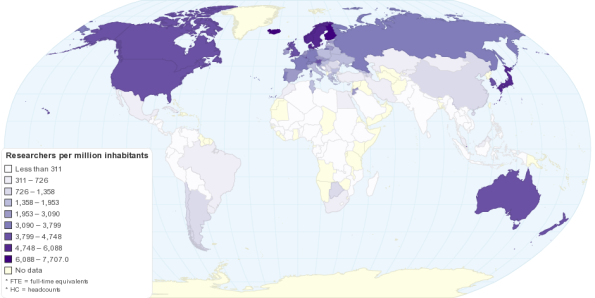
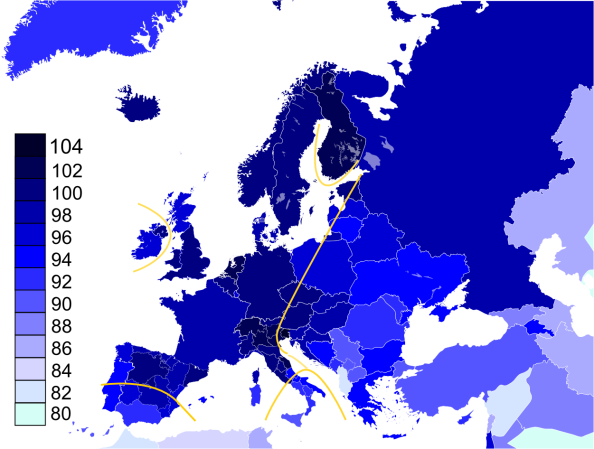

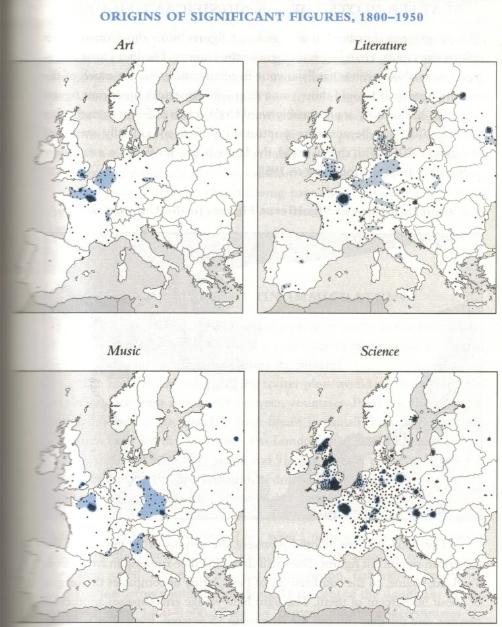





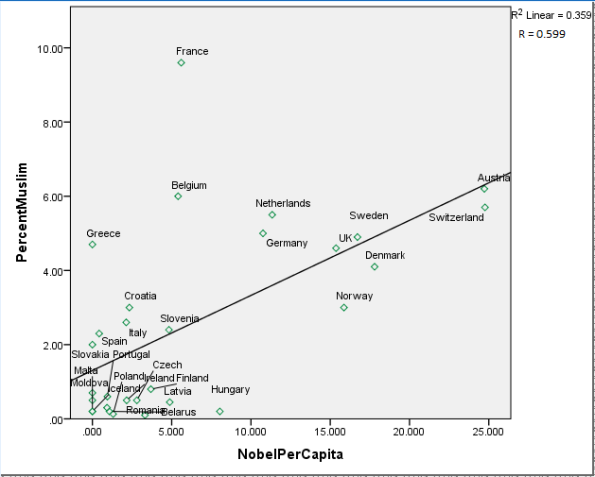
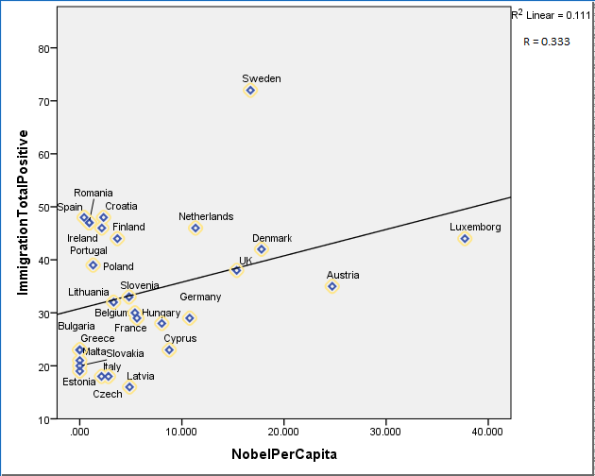






Okay, hands up, everyone: How many people put the flower in Category A? How many in Category B?
I saw this question a while ago; I looked at it for a moment, and said, “But what criteria am I supposed to use to classify it? Am I allowed to just stick it anywhere I want? Should I pick the flowers it most closely resembles (Category A,) or should I look for a single rule to classify them with?” Ultimately I decided the flower should just be with the flowers it most closely resembled, because this seemed most aesthetically pleasing.
What “triggers” me the most about the dissolution of my people’s civilization is the near certainty that our lack of clannishness will not be understood as the deciding factor. It will be lost in the memory hole. And our accomplishments will likely be expropriated by carrion feeders, like the Islamic world did to the cultures they conquered.
I would trust the Japanese to be objective in evaluating the decline of Northwest Europe, but not the Chinese. For obvious reasons.
Unless, of course, Charles Murray’s prediction that HBD will be undeniable in the 2020s comes true. Of course, undeniable doesn’t mean universally accepted, but then it could not be ignored as easily by future historians. And hopefully it will be Game Over for mass immigration, and Game On for some kind of soft White Nationalism (ie doesn’t need to be pure but a recognition of our uniqueness and right to have self determination).
As great as this blog is, if the internet ever goes dark it will be lost and even if the web never did it would be impossible to sift through the endless data to find it I imagine (but I confess I don’t really know much about how the worldwide web works). So one can’t rely on an Asian historian discovering it.
Liberals being bad at holistic thinking but great at abstraction explains a lot, such as the stereotype of the liberal who loves humanity but is kind of nasty personally.
They (liberals) really do strike me as the Mother if one were to imagine society as a family. So empathetic. Good at nurturing but bad at enforcing boundaries. Conservatives on the other hand are needed to set boundaries, like not letting the Somalis spend the night.
“This is a defining aspect on the clannishness dimension: low-clannishness peoples (WEIRDOs) see themselves as atomized individuals, who form associations voluntarily and not necessarily based on kinship. High-clannishness peoples see themselves as inherently part of the group (e.g., family, clan, tribe, village/town, etc.). ”
But then how you explain the segregationist systems created by people of Northwest-European stock (Anglo-Saxons)?
Jim Crow and Apartheid seemed very clannish to me.
And, paradoxically, the South Europeans peoples, less WEIRDO, never had those.
In Portuguese and Spanish colonial empires the European settlers mixed freely, and even were encouraged to do so, with the natives.
In fact, a common-place among the Portuguese when discussing our imperial past, is comparing it to the British one and then, by pointing the “racism” that was characteristic of it, conclude that because we never had any form of institutionalized segregation, our colonialism was more benign.
See the map at my post How Inbred are Europeans. See also several posts on the American Nations series. Note where the Cavaliers come from.
I see, the argument is that the Cavaliers were more inbred. That’s why they were more clannish and had segregation, right?
But were they more inbred than Iberians?
And another thing. The Meditarranean fascist regimes of the XX century were no racist. But Nazism, the German variant of Fascism, was racist, But Germans are certainly not more inbred than Italians and Iberians.
Arabs are extremely clannish and inbred, more clannish than American Southerners, and yet they have Sub-Saharan admixture which they acquired recently by mixing with their female slaves. Southerners on the other hand, thanks to their segregational system, lack African admixture in the proportion that Arabs possess.
That’s why I don’t think inbreeding explains the emphasis that Southerners (and Germanic peoples in general, who are the least inbred in the world) appear to put on race, contrary to the rest of the world.
Even today race is one of the main topics of public discussion in America, and that persisent presence of race talk in society is simply a thing that you don’t see in Latin European countries, including my own. Race doesn’t matter to us, even though we are more inbred.
And sorry for my poor grammar and spelling, I almost never write in English.
It’s not a linear function. There’s plenty of regional lumpiness overtop a general underlying trend.
Iberians did give us the encomienda system.
As for Germany and the Nazis, see my post Germania’s Seed. There is and was plenty of regional variation in Germany.
@ Portuguese Guy: In the German case, a tremendous number of the more liberal Germans moved to the US during the 1800s after some failed democratic revolutions in Germany. The more conservative, authoritarian Germans got left behind in Germany. If you combined the two groups, you’d probably get a total German population that is much more balanced.
EvolutionistX: Well, I have no idea if those migrations made significant genetic alteration in the German population which could have lead to an observable and substantial political shift. What I know is that strong National sentiments and even racial ones where common among Germans before the XIX century revolutions.
Reblogged this on Philosophies of a Disenchanted Scholar and commented:
The general sentiment seems to be Europe is Dying.
I am Indian and this is soooo true. I had lived in England for 8 years before returning back and I always felt we Indians were much more cunning, better at manipulation than the native English but the English seemed much more logical in their thought patterns. My personal theory had been that Northern Europeans (and maybe North East Asians) historically lived in a place which was cold with variable climate as well it was more or less homogenous with similar peoples in Northern Eurasia. Thus they had the following conditions in the ancient past and results in the present times
1] They had to compete primarily with nature as against other humans, population density was less in the ancient past as they lived in a harsh environment, a cold climate region with variable weather. Thus their brains were geared for planning and abstract thinking, better tools.
2] They had to cooperate with strangers to survive at critical moments and since genetically people were very similar with similar average natures, they cooperated with and trusted strangers a lot more.
In places like Middle East and Indian subcontinent, since agriculture developed faster here due to favourable conditions of climate, populations grew faster and this resulted in densely populated cities, a feature which reached Northern Europe much later maybe just during Roman/Greek times. Besides peoples from various races intermingled as the location of this region is central in location. African type peoples intermingled with Caucasians and even East Asians. India had black Ausatraloids, invading Caucasoids from West central Asia and Mongoloids from the East for example. Thus
1] Humans here had to compete primarily with other human beings. Thus humans cognitive had to develop more towards, cunning, swindling, cheating , arguing, survivalism, clannishness etc.. rather than developing those cognitive skills which needed dealing with making better tools to survive against the hardships of nature.
2] Having experienced multiculturalism and multiracialism earlier we were enriched with low trust natures. Supporting our clan/caste at all times ignoring universal morality at the expense of the other was of utmost importance.
I believe the huge gains made in Ancient India in the knowledge of the Mind (Meditation, complicated concepts common in the sermons of Hindu gurus) was a side effect in our cognitive abilities being channeled more towards reading other human beings and finding ways to manipulate them. Chanakya a cunning philosopher in ancient India was considered a hero in Ancient Hindu India which would never be possible in a Protestant European country. This is exactly why I find it strange that Whites are considered the most racist people, I think they were novices, we are far more racist but our methods are more subtle and we have more experience of it than the crude attempts made by White people. But on the other hand we were crap in inventing better tools, we did not even invent the wheelbarrow or a mere candle……
However I have always find Europeans like the Greeks more akin to us Asians (Asians as in Middle East/ Indian subcontinent not East Asia) than Europeans from the North just like I feel Somalis are more like us Asians than Africans from the south.
It’s amazing how HBD bloggers describe the different Europeans with so much granularity between their differences but lump the more diverse everyone else in their analysis. Could it that these holes are the key to debunking HBD or at least this specific hateful mutation of it?
Other major racial groups have their own within-race but between group differences (e.g., Chinese, Japanese, and Koreans are all different from one another, and significant group differences exist within those countries).